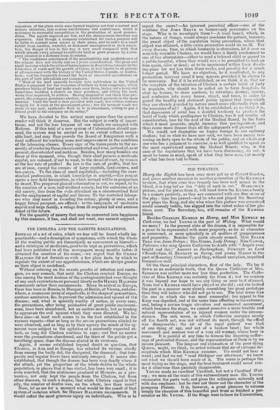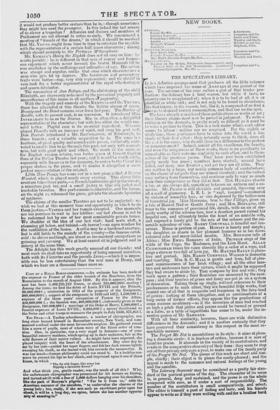TIIE THEATRES.
Henry the Eighth has been once more got up at Covent Garden, and given another occasion to another generation of the KEMBLES to show, that when once true tragedy has been well mixed in the blood, it is long before the " date of nock is out." HAReowe's picture, and the plates from it, will hand down the KEMBLE family to a remote posterity, as they are connected with one fine scene of the play : time has passed—and he who erst played the Secretary now plays the King, and she who when this picture was conceived could scarcely toddle, has slipped into the velvet robes of her glo, rious aunt. The Secretary, too, still remains of the KEMBLE blood.
Besides CHARLES KEMBLE as Henry, and Miss KEMBLE as Catherine, we had YOUNG in the part of Wolsey. What would we more ? In the present state of the drama, it is impossible for
a piece to be represented with more propriety, as far as character
is concerned, or more splendidly in all matters of gorgeousness and pageantry. Besides the parts already named, Miss ELLEN TREE was Anna Boleyn ; Mrs. G rens, Lady Denny; Miss CAWSE, Patience, who sang Queen Catherine to death with "Angels ever bright and fair;" ABBOTT as Buckingham, DURUSET as Lord Chamberlain, G. BENNETT as Surry, and young MASON in the part of Secretary Cromwell; and they, without exception, acquitted themselves well.
Of the three principal characters, first of the lady. We lay it down as an undeniable truth, that the Queen Catherine of Mrs.
SIDDONS was neither more nor less than perfection. The Cathe- rine of Miss KEMBLE was certainly far from it ; but we confess it was beyond our hope to see any thing so near to it attained. None but a KEMBLE could have played as she did ; and she looked
the part in a manner more closely resembling her great prototype than they will believe who did not go to see. The trial scene was the one in which she was most successful : her appeal to the King was dignified, and at the same time affecting in the extreme; and, bating a certain tragic elevation and measured movement, which becomes the stage, we cannot conceive a more forcible and
natural representation of an injured woman under the circum- stances. The sick scene, in which Catherine occupies nearly all the fourth act, was not without its merit,-though the effect
was disagreeable : the air of the royal patient was that of one dying of age, and not of a broken heart ; her whole
movement and manner was of a very old woman, whose hour is come. It is painful at any time to witness the lingering suffer-. inks of protracted disease, and the representation of them is by no means pleasant. The languor and exhaustion of the poor dying Queen, might, we think, be acted without that air of extreme de- crepitude which Miss KEMBLE assumes. We could not hear a word ; and had we not " read Shikepur one afternoon," we know not what we should have made of it. The scene is perhaps the most trying on the stage, and the best treatment could never ren- der it otherwise than painfully disagreeable. YOUNG made an excellent Cardinal, but not a Cardinal Ira- sey ; we miss all the traits of this extraordinary man. Mr. YOUNG
enunciates the parts well, and gives the soliloquies naturally and with due emphasis : but he does not throw out the character of the
pompous Prelate. It is, however, a great pleasure to witness simply the elocution of this beautiful-part from so finished' a- per- sonator as Mr. YOUNG. If the Stage were to have its Universities-,.. it would not produce better orators than he is,—though sometimes they might less need the prompter. Is this indeed the last season
of so clever a tragedian ? Attornies and doctors and members of Parliament are not allowed to retire so early. We recommend a meeting of "friend's of the drama," in which it should be resolved
that Mr. YOUNG ought from time to time to entertain the republic with the representation of a certain half dozen characters ; among which should certainly be Sir Pertinax M'Sycophant. Mr. ICENIBLE'S Henry the Eighth does not sit easy on him : he wants joviality : he is deficient in that vein of coarse and humor- ous enjoyment which never forsook the brutal Monarch till he was overtaken by the sufferings and infirmities of age. His action was abrupt and angular, unlike that ease which characterizes a man who gets fat by degrees. The boisterous and peremptory traits were better—nay, very ably represented ; and we should in vain look for a better representative of the royal wife-destroyer and queen-fabricator. The coronation of Ann Boleyn, and the christening of the child Elizabeth, are shows only redeemed by the proverbial propriety and magnificence of this house in all matters of pageantry. With the tragedy and comedy of the Kr:U.131.ES and the Youszos, there has alternated at this theatre the lighter charm of opera. Beauty and the Beast remains over from last year. The Barber of Seville, with its present cast, is an accession. It introlneed Miss INVERARITY to its as the Rosina. She is, altogether, a delightful representative of the character; but with less effort she would suc- ceed better. Playful ease is its essential ingredient. WILSON played Fiorello with an increase of spirit, and sung his part well. Don Bartok introduced a Mr. REYNOLDSON, of Edinburgh, to these boards ; and a valuable acquisition he is. His voice is a. baritone, of good quality and considerable power, sufficiently culti- vated to enable him to go through this part, not only with correct- ness, but with great spirit and effect. So much of the opera as the English version retains, was better given at Covent Garden than at the Italian Theatre last year; and it would be worth while, especially with BRAHAM in the company, to assign to the Count his proper station in the piece, and to render it altogether a more perfect representation of the original.
Little Miss POOLE has come out in a new piece called A Genius Wanted, which is played nearly every evening. This clever little creature takes three parts,—a French tambourine girl in the streets, a miniature jack tar, and a small jockey in blue silk jacket and buckskin breeches. Her performanceis admirable, and the house, on the night we witnessed the piece, got into the absolute hysterics of applause.
The claims of the smaller Theatres are not to be neglected: we wish we had at this moment time and opportunity in which to do them justice,—VESTRIS and her temple excepted. Our moments are too precious to wait in her lobbies : our last rheum is not to be redeemed but by one of her most comfortable private boxes. We shudder at the idea of our last visit : hard seats aloft, a steaming pit below, and behind—oh horror!—an open window for the ventilation of the house. A critic may be a hardened creature, but is still liable to the malady of the country—the famous catch- cold : to shiver and laugh, are about as inconsistent occupations as grinning and yawning. We at least cannot sit in judgment and in misery at the same time. The Adelphi has this week greatly amused all our friends ; and next week we shall take an opportunity of being amused ourselves, both with its Victorine and the pseudo Lions,—which it is impos- sible can be less entertaining than the real ones at Drury, and which we hear are a thousand times more so.































 Previous page
Previous page